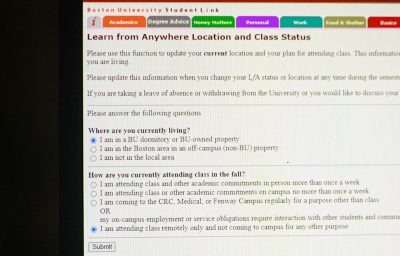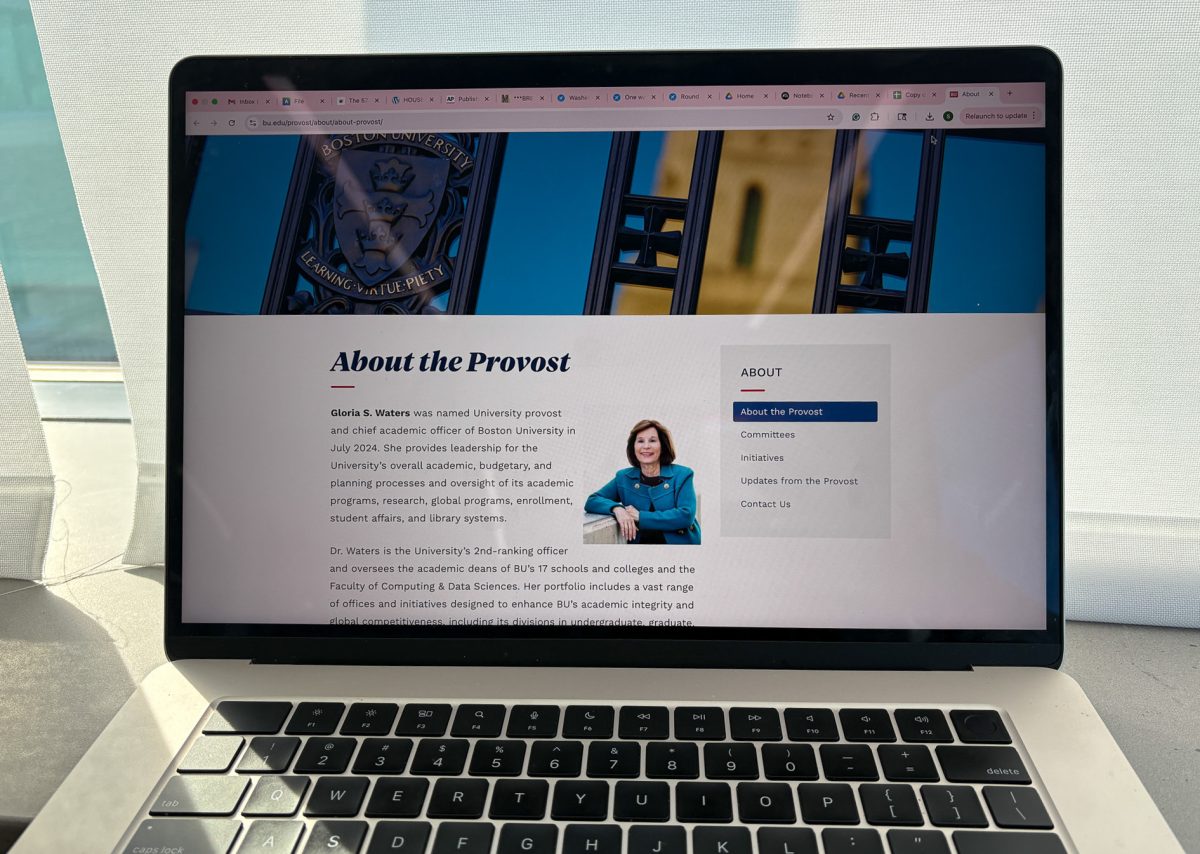
When Boston University announced its Learn from Anywhere approach to the Fall semester — a hybrid model that saw some students return to campus and others study remotely — it told students who returned that they could opt out of in-person learning and choose to attend from afar at any time.
Meanwhile, some students are learning remotely despite coming back to Boston with plans to attend classes in-person.
Nearly 70 percent of the student body returned to campus this Fall, according to BU spokesperson Colin Riley. With classrooms across campus equipped to accommodate social distancing and other safety measures, he said the University hasn’t encountered any major issues so far.
“Fortunately, it’s all worked out, the planning in that regard,” Riley said. “Our scheduling and planning for classroom instruction and with appropriate precautions has worked out well.”
One University precaution involves students leaving Massachusetts for Thanksgiving this November. In a July 29 letter to the BU community, University Provost Jean Morrison recommended that students traveling out of state not return to campus following Thanksgiving break.
Riley reaffirmed the recommendation, which reminds students they will be subject to Massachusetts quarantine rules if they return from an area the state’s Department of Public Health deems high risk.
Some students confirmed they plan to stay on or near campus for the rest of the semester and don’t plan on leaving for Thanksgiving, but some said had they known most of their classes would be held online for the most part, they may not have come to campus for the semester at all.
Anastasia Eremina, a junior in the College of Arts and Sciences, spent the summer convincing her parents she should return to Boston for Fall. After making the trip back to the U.S. from her home in Moscow, she discovered three of her five classes would be held remotely.
Had she known earlier in the summer, Eremina said, she would have considered staying home and taking the semester off, especially after having stayed in Russia since Spring semester went online.
“For the past six months, I’ve been home with my family and that was the first time in a few years that I spent more than a few months in Moscow,” Eremina said. “I actually realized that I’m very homesick right now and I would like to spend more time at home.”
CAS junior Adriana Celaya said while she is glad to be back on campus, she is disappointed that out of her five courses, three turned out to be fully virtual. What made the situation more frustrating, she said, was not being able to get answers during Back2BU informational sessions earlier in the summer.
“The information sessions that they had on Zoom for each college really weren’t that helpful,” Celaya said. “I had a lot more concrete questions that I wanted answered that they never got back to me like they said they would, and I would submit them in every single meeting.”
Reaching out to professors over the summer did not yield many results either, Celaya said. In some cases, she said she didn’t hear back until after tuition was due.
While she said she doesn’t blame faculty, Celaya wrote in a later email that she may not have returned this semester had she known this would be the outcome.
For Sofia Wyszynski, a junior in CAS who plans to graduate in December 2021, taking the semester off was not an option. But after returning to Boston, she found some of her smaller courses switched to online instruction, which she said was disappointing.
“I’m not sure how medical schools are going to respond,” Wyszynski said. “Some schools, according to the pre-professional office, have been saying that they are not going to look at a virtual lab the same as an in-person lab, so that’s definitely something I’m wary of.”
Wyszynski learned this in April through an email from the pre-professional office that asked medical and dental schools how they felt about virtual labs. Wyszynski said while she felt she couldn’t name which school said what, the messaging made it clear some “big-name schools” want students attending labs in-person.
For now, she said one of her biology courses involves online lectures, but will hold in-person labs outdoors. She added that while the situation is not great, she is overall glad to be back on campus.
“I do think that BU is doing the utmost to keep campus clean and safe for everybody,” Wyszynski said. “I am impressed by that. I do think professors are taking it seriously and that students largely are as well, so I’m pretty happy with that.”
In some cases, the switch from in-person to virtual learning has worked better for students. For CAS senior May Painter, online courses have been enjoyable compared to in the Spring semester, during which her living situation forced her to attend some classes in her studio apartment’s bathroom in order to be uninterrupted.
Now attending class from her single-occupancy room, Painter said she may prefer learning remotely.
“I have surprisingly enjoyed my classes being online this year, as compared to how it was during Spring semester, which was awful,” Painter said. “I expected it to be just as awful this year, but no.”
Still, Painter said learning that three of her four courses were going to be remote was not ideal. As a recipient of a full-tuition scholarship, she said she would be coming to campus no matter what this semester, but things would have been different without it.
“If I were not on a full scholarship,” Painter said, “I would be extremely upset that I was doing all of my classes from my dorm room and paying the same price for it.”
Now that the semester has begun, the University will not provide full tuition or housing refunds for those who choose to leave. Partial refund amounts depend on when the decision is made.
Students who withdraw from classes or take a leave of absence between Oct. 1 and Oct. 7 will get a 20-percent refund on tuition. Metropolitan College students will receive a 50-percent tuition refund until Sept. 30.
The last chance to get partial refunds — in the form of University credit — for room and board is the period between Friday and Oct. 1, for 20-percent housing credit.































































































































Perry Donham • Sep 24, 2020 at 10:31 am
Professor here. I have 371 students this semester in my courses. Of those, 176 students have indicated that they are in-person, on campus. One would expect a relatively full room and enough bodies to spark discussions.
I see about 16 students total across three courses in person each week. One course with 211 enrolled and 98 indicating they are in-person meets in the Tsai auditorium. Approximately 8 students attend lectures. I have to remove my glasses so that they don’t fog up while I’m wearing a mask, and so I don’t even get to see those 8 brave souls from the stage.
Historically, attendance declines as the semester progresses. I can only imagine that I’ll be down to one or two students sitting in the back rows in a few weeks, and probably none at all after Thanksgiving.